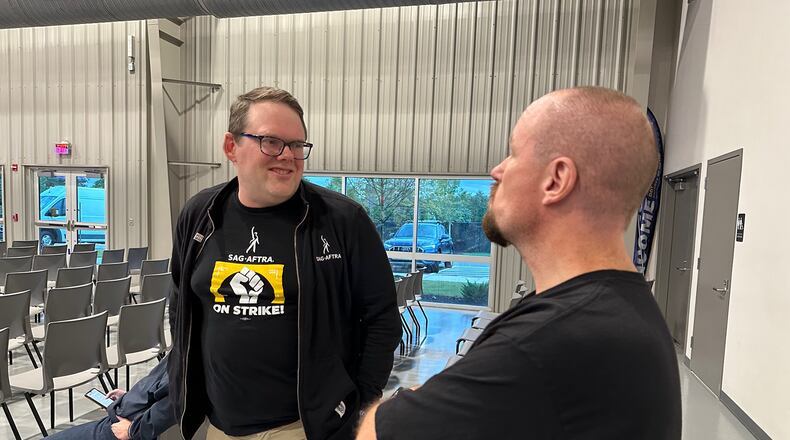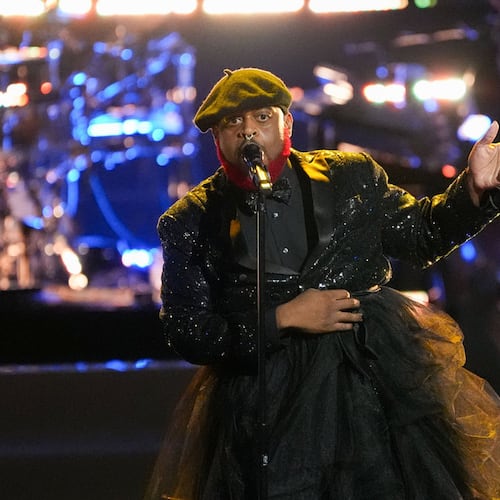With the actors strike having just passed the three-month point, SAG-AFTRA was in intense negotiations earlier this month with TV and film producers to iron out a new contract.
But last Wednesday, the Alliance of Motion Picture and Television Producers (AMPTP) abruptly cut off talks. In a press release, the group representing the likes of Hulu, Netflix, NBCUniversal and Warner Bros. Discovery said “after meaningful conversations, it is clear that the gap between the AMPTP and SAG-AFTRA is too great, and conversations are no longer moving us in a productive direction.”
This move surprised SAG-AFTRA chief negotiator Duncan Crabtree Ireland, who spoke to The Atlanta Journal-Constitution after attending Atlanta Pride celebrations over the weekend and extending his trip to meet with local union members Monday evening at the Teamsters union hall in Atlanta.
“We are urging them to get back to the table through back channels and through every method at our disposal,” said Crabtree Ireland, who spoke to The Atlanta Journal-Constitution before the event at the Atlanta Teamsters union hall. He has worked for SAG-AFTRA for 23 years and has been the union’s national executive director and chief negotiator since 2021. “We just want good faith negotiations and a good deal.”
Credit: RODNEY HO/rho@ajc.com
Credit: RODNEY HO/rho@ajc.com
Here are highlights from the 20-minute conversation:
Feelings after the Writers Guild of America ended their strike after 148 days: “What gave me a sense of optimism was when the CEOs themselves were ready to sit down at the table with us [instead of just their hired negotiator]. That to me was a sign of being serious about moving a deal forward. It was very disappointing and frustrating when they decided to walk away from the table.”
Revenue-sharing proposal rejected: SAG-AFTRA first asked for a revenue sharing system for actors regarding streaming money. It was non-starter. “From our point of view, as revenues go up with price increases, actors should receive more collectively. They can better keep up with inflation this way and track the growth of the industry. These are publicly reported numbers from publicly trade companies. It’s straightforward. But they absolutely refused. They didn’t want to do anything attached to revenue. This is a line in the sand they drew.”
Compromise proposal not taken seriously: SAG-AFTRA modified its streaming proposal to base residual pay on a combination of revenue per subscriber and viewership. That didn’t go over well either. AMPTP said even the latter construct would “create an untenable economic burden.” Variety estimates the two sides are separated by about $480 million. Crabtree Ireland said he was confused because the WGA and the existing residual arrangement for streaming is based on number of subscribers. Walking away, he said, “is a tactic that is intended to drive down the amount of money they have to put into this. We made it economically equivalent to 57 cents per subscriber per year. As I like to say, it’s less than a postage stamp. That’s pretty reasonable from my point of view. They obviously don’t see it that way.”
His theory on why they walked away: “It’s the same playbook they did with the Writers Guild. This is a test of our solidarity and unity. They are probing to see if they can get our membership to splinter. I don’t think that’s going to happen at all. We’ve been eager to be back to the room to talk to them. They are always walking away and refusing to talk.”
Unions are strengthening: After decades of weakening, unions appear to be making some headway and improving their standing in the public, as evidenced by the recent near strike by Atlanta-based UPS and strikes by healthcare and auto workers. “People are definitely hurting and they understand what we are fighting for,” he said. “The general public is starting to realize that the way these companies treat people is not okay. We can actually do something about it. Get together, stand strong, assert ourselves and make a lot of progress.
Artificial intelligence: “AI is evolving so much, it’s really crazy. The producers are saying they agreed on consent and fair compensation. We’re holding them accountable to the language so it’s real consent, not fake consent. Consent can’t be boilerplate language buried 12 pages down that gives away their rights forever. Consent means you have to know exactly what they are going to do with your image and you have to say it’s okay. It’s that simple. That is the direction we’re heading in and I think we can get there.”
Entire industry is hurting: “I want to express appreciation to the Teamsters and IATSE [two other unions repping entertainment crew members]. We know what impact the strike has had on them but we are all fighting together for the same types of rights.”
Credit: RODNEY HO/rho@ajc.com
Credit: RODNEY HO/rho@ajc.com
The Atlanta SAG-AFTRA chapter: “”When they turned out 1,000 people at that first rally in July, it reflected the strength of the production community and SAG-AFTRA here. We have a group of very talented and dedicated members. Two of them from this local chapter are on the negotiating committee [Eric Goins and Mike Pniewski.] They were right in the thick of things during the negotiations.”
On working with actress Fran Drescher, SAG-AFTRA president: “She is one of the most courageous people I know. She is absolutely unflinching in standing up to powerful people. She is a very honest and straightforward communicator. I think that has really resonated with the public. It has really been an honor work side by side with her during these negotiations. Her passion has really engaged the public.”
Addressing regional bias against Georgia actors: “We have a proposal on geographic disparity and the way companies contract with performers. That’s driven by places like Georgia where actors are looked at for the same roles as people in New York and Los Angeles but not offered the same compensation. We’ve seen evidence of that happening and brought it up as an item in these negotiations.”
About the Author
Keep Reading
The Latest
Featured





